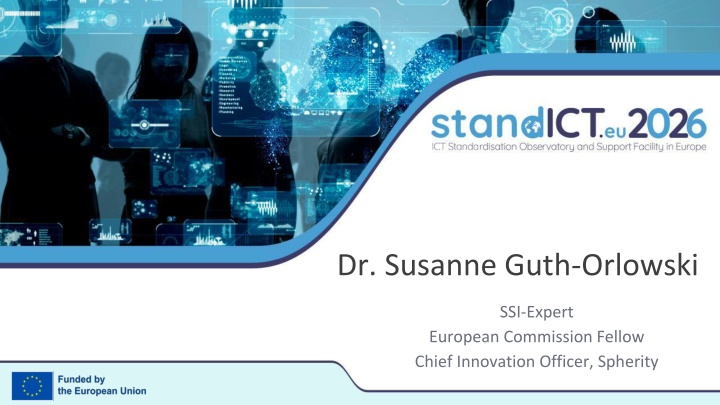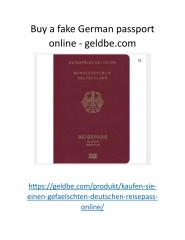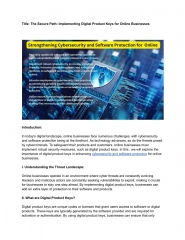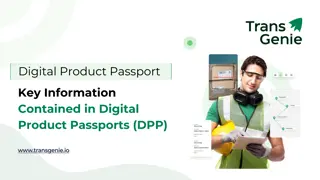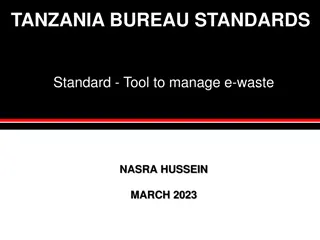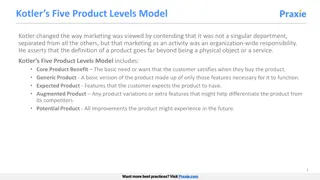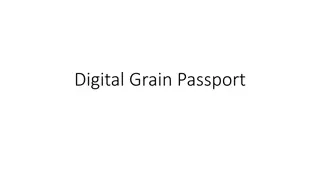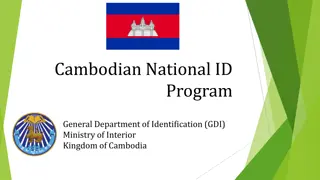Implementing Digital Product Passports: Best Practices and Standards Overview
This content provides insights into implementing Digital Product Passports (DPP) using decentralized identity standards. It includes key projects and partnerships focusing on identity and supply chain ecosystems, showcasing the benefits of a decentralized approach. The report emphasizes the importance of understanding technical standards and offers guidelines for creating decentralized identifiers, issuing data for digital passports, and verifying passport data integrity. The aim is to support compliance and security in various industries.
Download Presentation

Please find below an Image/Link to download the presentation.
The content on the website is provided AS IS for your information and personal use only. It may not be sold, licensed, or shared on other websites without obtaining consent from the author.If you encounter any issues during the download, it is possible that the publisher has removed the file from their server.
You are allowed to download the files provided on this website for personal or commercial use, subject to the condition that they are used lawfully. All files are the property of their respective owners.
The content on the website is provided AS IS for your information and personal use only. It may not be sold, licensed, or shared on other websites without obtaining consent from the author.
E N D
Presentation Transcript
Dr. Susanne Guth-Orlowski SSI-Expert European Commission Fellow Chief Innovation Officer, Spherity
Projects on Identity & Supply Chain Business Ecosystem Scope Key Partners Spherity's Focus Support Type CARO Authorized Trading Partner (ATP) authentication for compliance in the US Pharma Supply Chain For the Drug Supply Chain Security Act RFXEL, Novartis, SAP, LEGISYM, HDA Enterprise Identity Commercial Production Deployment EUDI Wallet -eIDAS 2.0 Revision -EU Digital Identity Wallet -Citizen ID -Enterprise ID -Digital Product Passport -ArgriFood Track & Trace -EBSI Compliant Schweizerische Bundesbahnen AG, Worldline, Amadeus, Sicpa, IntesiGroup, DATEV, IDunion, some EU member states Enterprise Identity R&D contract, EU funded Trace4EU 33 Partners (Trace4EU R&D Consortium, Infocert, IntesiGroup, some EU members states, 10 Governments, other) Lead Workpackage for Product + Material Tracing R&D contract, EU funded MaDiTraCe -Raw Material Traceability -EBSI Compliant -Digital Product Passport 15 Partners (e.g., DMT, BRGM France, Montanuniversit t Leoben, University Gent) DPP / Identity for Critical Raw Material Tracing R&D contract, EU funded Energy & Mines Digital Trust (EMDT) -Enterprise ID -ESG Compliance / GHG reporting - State Licenses British Columbia Government, Pricewaterhousecoopers (pwc), London Metal Exchange, Wallet Providers Enterprise Identity Development, SaaS Identity & Trust Enterprise ID Digital Product Passport IDunion Bosch, Bundesdruckerei, Deutsche Bahn, Deutsche Telekom, ING, Siemens, Gematik, Merck, DATEV, Bundesanzeiger Verlag R&D Focus, Business Development, Product Passport Definitions R&D contract. German BMWK Identity & Trust Data Spaces Domain Use Cases (Automotive, Supply Chain, Energy, other) Gaia-X Federation Services BMWK, eco Verband, T-Systems, etc. Building the NOT API Open Source Development 2
Generic Architecture for Landscape of Digital Product Passport Standards 3
What you can do and cant do with the report What you can do: - - Find a collection of standards to implement a DPP in your industry / product segment. Understand the areas where technical standards are needed. What you can t do: - - Use it as best practice on how to implement DPPs compliant to the ESPR regulation. See how the standards relate to each other. What is needed, is a guideline how to use the standards, which ones relate to each other and which ones make your DPP solution compliant. Security of investment! 4
How to use the DPP Standards Landscape implementing a decentral solution Guth, Ebert, Thiermann, Implementing Digital Product Passports using decentralized identity standards , Medium, April 2023 Short summary: It references standards from the Landscape and shows best practice how to: - Create decentralised identifiers for involved parties and products Issue data for a digital product passport, Create a data carrier Find the digital product passport by using a data carrier. Verify data of the digital product passport. Benefits of a decentralised approach - - - - - https://medium.com/p/f1102c452020/
Benefits of a decentralised DPP implementation - Companies have a high need to insert trusted data into their internal systems. Data in the form of verifiable credentials can meet this need and provide an end-to-end verifiability. - A decentralised approach allows an ad-hoc trusted data exchange data without a bilateral integration, also referred to as decentralised integration . - A decentralised approach makes central components obsolete, which saves development, deployment, management and other ongoing costs which come with central components. - We see first implementations of decentralised data ecosystems in the Gaia-X, Gaia-X Federation Services, and in Catena-X. 6
Continued benefits - Product information stays with its owner. The owner of the data has full control over who can access his data. - Because product & company data is not uploaded to central platforms and shared multiple times, the data is always up to date. - Entry barriers are low as reference implementations of the open standards are open source (GXFS). - Decentralised technology is inclusive and permissionless. Everyone with a wallet can technically participate in the ecosystem. - Potentially, the approach helps show compliance to other regulations (such as the Supply Chain Act, the EU Directive on corporate sustainability due diligence, EU Critical Raw Materials Act, the lately announced Green Claims Directive) 7
To find out more visit: standict.eu Get in touch! Stay in touch on Twitter @Stand_ICT Join us on Linkedin linkedin.com/in/standict
